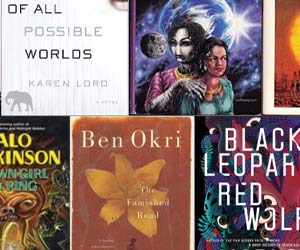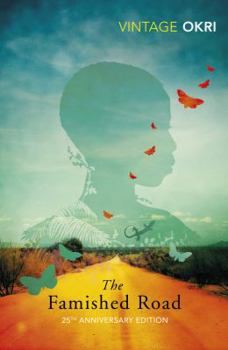Book Overview
BOOKER PRIZE WINNER - A modern classic that reveals the tension between the land of the living, with its violence and political struggles, and the temptations of the carefree kingdom of the spirits. -... This description may be from another edition of this product.
Format:Paperback
Language:English
ISBN:0099929309
ISBN13:9780099929307
Release Date:January 1992
Publisher:Vintage Classics
Length:592 Pages
Weight:0.84 lbs.
Customer Reviews
5 ratings
Storytelling in the key of myth, in the rapture of magic.
Published by Thriftbooks.com User , 18 years ago
Cave-dwelling humans told their own stories with well placed marks on walls, precise sounds and bodily gestures. In all cultures, to delight and instruct, people tell stories and recite poetry that imitate life as they experience it but not necessarily palpably. Not only are these stories different but so are their modes of presentation. This review should prepare you for the interwoven anecdotes that comprise The Famished Road. I am a Yoruba and the narrator of Okri's book, Azaro, is an `abiku' which literarily means `one born to die' in the Yoruba language. Ultimately, we are all born to die so abiku refers strictly to consecutive deaths of an infant; it underscores the eternal belief of Yoruba people in reincarnation and names like Kokumo, (will not die again); Malomo, (don't leave again); and Rotimi, (stay with me), are supplications to abiku children. When the pleas are not heeded, radical measures are sometimes taken in the form of branding an already dead infant with the hope that the blemish will lead to its rejection by peers in the spirit world. It is almost always observed that a child born right after a `branded' one not only returns with the exact `mutilation' as a birthmark but it also does not return to the spirit world! One must suspend disbelief to experience osmosis with Azaro's accounts. From time immemorial, raconteurs told stories replete with myths and superstitions. In much more recent memory, the philosopher, Aristotle, proposed structural elements for Western stories: plot, to unify time, space and action in linear, palpable and causal ways respectively; characters that are rationally motivated; realistic points of view, settings and so on. Sans Aristotle, sans formula, this story is narrated at different levels of consciousness: it is a diffusion of the impossible or implausible into earthly possibilities, suffused with space-time-warping phenomena; anecdotes narrated in the media of haunting by the dead; dreams that foreshadow or flash back to reality; Kafkaesque transformations into creatures interpenetrating one another; grotesque, carnivalesque occurrences and laughable terror a la Rabelais; mutual, mimetic dramatization among incongruous acts; simultaneous dealings with God and the devil and other rich ambiguities! As we are alone in our essential moments - birth and death, for example, Okri may have made us forbidden eavesdroppers on Azaro's essential moments. If we believe some deconstructionists, Okri's narrator, Azaro, chronicled the emergence of Nigeria from British colonialism through the third eye that writers in the tradition of Magical Realism employ to create fantastic and surreal images, allegories, metaphors and symbolisms. Another character in the book, Madame Koto, stands in for the dilemma of the upper class in that country when confronted with insufferable deprivation of others. The use of Magical Realists' techniques for political indictment situates Okri squarely in a literary lineage stretching
Astonishing!
Published by Thriftbooks.com User , 19 years ago
I found this book on the first night of a stay at a lodge in remote Costa Rica. It is the most beautiful book I've ever read. Much of it was read aloud to my partner. The author's command of the language and lyricism make for a magical read. You are in capable hands with Ben Okri. The book probably makes more sense to those with some knowledge of Nigerian mythology. As a reader without this knowledge, I surrendered to the beauty he created and had an incredible experience.
Ponderous in its creation, yet it satisfies on all fronts!
Published by Thriftbooks.com User , 19 years ago
War, strife, misery, corruption, poverty, emotional and physical brutality, hypocracy, intimidation. It is a short list, but they are indeed the fundamentally potent ingredients that could make anyone who is simmering in the total unhappiness of it all truly yearn unceasingly for an existence in another realm, where the chains of seemingly unending suffering are simply melted away into nonexistence. In poverty laced and psychologically decimated "modern" Nigeria, as written by Ben Okri, the Nigerian society as a whole or a good chunk of it, would be one camp where death would be a liberating gift from the undesired toilings of harsh day-to-day realities. With mellifluous simplicity, Ben Okri creates duel worlds: one heavenly, one earthly. And in the duality, there is a responsive spirit-child named Azaro who can cross the bridge of life into death and death into life, as one who consistently has near death experiences. But each requires a sacrifice, for when Azaro traverses into the dimension of spirit, he must leave behind his mother and father who love him, though much of his earthly actions bring about stress and frustration, as well as joy and pleasure--more of the former than the latter, however. But if he stays in the land of the living, he must endure the hardships that are naturally affixed to it. He gets himself stuck, as if in a Catch-22, hankering for both the spiritual and earthly worlds. Through the vast array of characters: Mom, Dad, Madam Koto, the Photographer, various political yes-men, the boxer Green Leapard, the blind man, Ade, et cetera, the raw yet richly cultured Afrocentric aura looms lushly outward in an almost literary 3-D manner. Village life, culture and mythical behavior, as well as the "game" or "tragedy" (you choose) of African politics via the technique of magical realism is very much fleshed out. The simplicity of the writing style in no way, shape or form mollifies the palpable depth of the characters who must live and survive in an all-too-consuming oppressive environment that would seem quite alien to most of us---in an upper/middle class creme de la creme point of view. The Famished Road is dense, plodding and absolutely wild in its limitlessness of human imagination, a genuine wordy and intellectual tour de force if ever there was one and certainly worthy of its Booker Prize!
Surreal
Published by Thriftbooks.com User , 24 years ago
I found this book by accident a while back...as I rummaged through some huge bookstore. I read it. It brought back memories of home: the superstitions of Nigeria. Tales of "Mammi Water" (sirens), Ogbanjo (ghost children, or children who are reborn only to die young), Gbomogbomo 9kidnappers). Our versions of boogie-men. It also reminded me of the beauty of oral tradition and the invincable spirit of tenacious, flamboyant, determined, ever witty Nigerians. The tale is mesmerizing, fantastic, fantabulous, and beautiful. Now if I could only get my mother to relinquish it so I can re-read it, I could die happily!
not your ordinary book
Published by Thriftbooks.com User , 24 years ago
Those people who grew disappointed because they were looking for a "plot" and "character development" were looking for the wrong things. This is a book about consciousness, point of view, and how the world is seen from a standpoint of sacredness. The little boy is not so much the narrator as the consciousness that filters this world to us. No, there is not much in the way of plot, although many things happen. "Going somewhere" is not what this book is about. Rather, "being somewhere", and viewing that place in a different way, is what it is about. This the author accomplishes stupendously, with vivid, imaginitive prose, a startlingly original worldview, and an amazing eye for detail. If you like unique books that challenge your ordinary perspecitive on things, this book is for you. If you usually read Stephen King or Tom Clancy, forget it
The Famished Road Mentions in Our Blog

A Virtual Explosion of Black Science Fiction
Published by Ashly Moore Sheldon • February 19, 2020
For Black History month we're bringing you a series featuring great black writers from four genres. This week, we feature Science Fiction/Fantasy, also known as Speculative Fiction. Here are nine authors who are blowing our minds.






